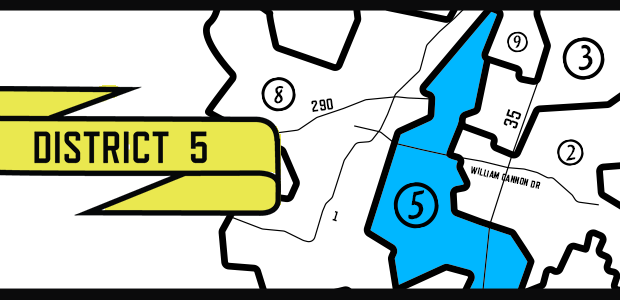Kitchen reflects on past year, looks forward to next
Wednesday, December 30, 2015 by
Tyler Whitson City Council Member Ann Kitchen has a long list of what she considers to be the first 10-1 Council’s achievements in its first year, but she also has ambitious plans for what she hopes the body will accomplish next year.
Kitchen, who represents a central chunk of South Austin by way of District 5, ticked off items in an interview with the Austin Monitor on Dec. 11 and talked about ways in which Council could improve and progress.
The accomplishments Kitchen cited include reducing the city’s property tax rate, implementing a 6 percent general homestead tax exemption, increasing funding for health and human services and parks and recreation, and challenging the Travis Central Appraisal District’s Austin commercial property valuations.
Consistent with the interview she gave to the Monitor before taking office last year, Kitchen first mentioned revamping Council’s structure and procedures.
“I think the changes that we made with regard to how we’re organized and our committee system were among the greatest achievements,” Kitchen said. “We continue to work with our Community Engagement Task Force and with our (Council) Transition (Work Group) to refine those, but I think they were good changes and we made a big difference.”
Kitchen acknowledged one aspect of the transition that some have criticized, however. “I think we’re still working on improvements to how we handle meetings. … I think we could continue to work on that, to manage our agendas so that we could keep with our promise to end our meetings at a reasonable time so that the public has a reasonable chance of participating.”
Council’s last meeting of the year, on Dec. 17, went past 1:30 a.m.
As chair of the Council Mobility Committee and member of the Capital Metropolitan Transportation Authority and Capital Area Metropolitan Planning Organization boards, Kitchen has made transportation one of her top priorities this year.
“We made a lot of progress on safety,” Kitchen said, referring to Council’s funding of improvements for the city’s five most dangerous intersections as identified by the Austin Transportation Department and the dispersal of most of the $21.8 million “quarter-cent fund” – collected by Cap Metro – for mobility-related projects evenly across districts.
Larger transportation planning projects, Kitchen said, are on the docket for next year. These include revisiting the city’s Strategic Mobility Plan, acting on the Vision Zero Task Force’s forthcoming recommendations to eliminate traffic fatalities and “aligning better the impact on transportation of development and aligning what (developers) pay” through transportation impact fees.
Kitchen said she is also looking forward to Cap Metro developing its long-range transit service plan to 2025, which the agency hopes to have completed by the end of September.
“These are planning processes, but transportation is such a long-term issue,” Kitchen said. “These are things that we started this year, but we’ll be getting the results from next year and then we’ll be making policy decisions around.”
Kitchen also said she was proud of leading Council efforts to restructure ground transportation regulations by rewriting taxicab regulations, renewing the city’s taxicab franchise agreements, initiating the creation of a worker-owned taxicab cooperative and establishing operating fees and a fingerprint background check framework for transportation network companies, or TNCs.
The fingerprint background check framework that Council adopted on Dec. 18, which was originally proposed as a requirement, now envisions penalties for TNCs that don’t meet certain benchmarks starting in May and incentives for those that do.
“The Council does not wish any TNC to leave the Austin community or the drivers that depend on them, but that is a choice for the TNCs themselves to make,” reads a Dec. 18 press release from Kitchen’s office.
Uber, which mounted an aggressive campaign directly criticizing Kitchen, stated, also on Dec. 18, that the new ordinance is not “a solution that (will) keep Uber in Austin.”
Kitchen’s press release notes that Council plans to revisit issues related to the new ordinance in January.
Kitchen also noted that flooding has been a major issue for her district this year, with recent flooding near upper Onion Creek and rapid infill growth along the South Lamar corridor raising serious concerns. “We have accomplished some things around flooding, and we have more to do,” she said, citing the establishment of the Flood Mitigation Task Force in September.
In addition, Kitchen said, Council is “working with the Watershed (Protection) Department in the middle of an engineering analysis, and we’re expecting results in February to tell us whether there’s an engineering solution for upper Onion Creek or whether we have to consider buyouts.”
The South Lamar Neighborhood Mitigation Plan, which Council adopted in December 2014 to regulate development in the area to reduce drainage impacts, remains in place.
Kitchen said she is looking forward to further action on CodeNEXT, a comprehensive rewrite of the city’s Land Development Code that the city plans to adopt late next year, as well as other long-term efforts Council will be taking up or revisiting next year. “There are policy issues that we have started to wade into that we know we need to do more on,” she said.
You're a community leader
And we’re honored you look to us for serious, in-depth news. You know a strong community needs local and dedicated watchdog reporting. We’re here for you and that won’t change. Now will you take the powerful next step and support our nonprofit news organization?







